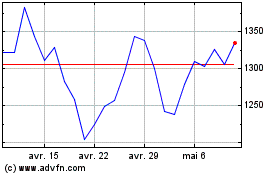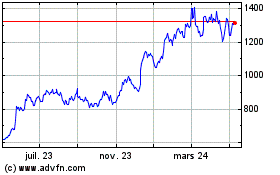Tech Firms Say China Tariffs Will Set Back U.S.'s 5G Goals
07 Septembre 2018 - 8:18PM
Dow Jones News
By Jay Greene
A handful of tech giants are invoking one of the White House's
priorities -- leadership in an emerging wireless technology known
as 5G -- to argue against adding tariffs on $200 billion in goods
coming from China.
Intel Corp., Cisco Systems Inc., Dell Technologies Inc. and
other tech companies are seeking to convince the U.S. Trade
Representative to nix plans to place tariffs on products they say
are vital to rolling out fifth-generation wireless services in the
U.S.
By raising costs for the goods required to build 5G networks,
the proposed tariffs "will slow down the pace of technology
adoption across the U.S. economy, causing American firms and
institutions to fall behind foreign competitors outside of China
that aren't subject to the same tariffs," Intel wrote in comments
filed with the agency late Thursday.
The tariffs appear to run counter to the White House's stated
goal of leadership in 5G technology. In March, the Trump
administration scuttled Broadcom Ltd.'s $117 billion hostile bid
for Qualcomm Inc. after a U.S. panel that vets foreign deals raised
concerns the acquisition could stymie the San Diego chip maker's 5G
development. At the time, the White House held up U.S. leadership
in 5G development as an issue of national security.
The U.S. Trade Representative is reviewing comments before
making a final determination on specific products to tariff. The
Trump administration wants to make sure China competes fairly in
the emerging 5G market, White House deputy press secretary Lindsay
Walters said.
"No final decisions on specifics have been made," she said.
The White House is preparing to increase pressure on China by
putting up to 25% tariffs on as much as $200 billion in Chinese
goods. That would be on top the $50 billion of Chinese exports the
administration already hit with 25% duties. The public comment
period on the new tariffs ended Thursday, the last step before a
decision.
President Trump on Friday threatened another $267 billion in
tariffs on Chinese goods, saying they could be rolled out on short
notice.
It isn't clear how significant the impact of tariffs will be on
American 5G competitiveness, said Chetan Sharma, a mobile-industry
consultant. The market is still nascent, and the supplies of
infrastructure for the new technology are only beginning to move
out of China.
"But if this situation lasts too long into 2019, then there
could be measurable impact," Mr. Sharma said.
The tech companies argued tariffs would stall next-generation
technology that promises higher-speed connections needed for
self-driving cars, wireless virtual reality and other
innovations.
The tariffs would raise costs on goods such as routers and
switches used to roll out 5G, said Cisco, Dell, Hewlett Packard
Enterprise Co. and Juniper Networks Inc. in a joint filing.
Wireless-service providers would pass those increases to consumers,
raising prices for mobile plans, they said. And higher costs would
reduce incentives to improve networking infrastructure, the
companies asserted.
Like Intel, the companies wrote "the proposed duties would have
a detrimental impact on broader U.S. economic and strategic
priorities."
Moreover, the companies argue, reduced profits caused by the
tariffs could lead to "hiring freezes, stagnant wages, and even job
losses, as well as harm to investors such as reduced dividends and
erosion of shareholder value," the companies wrote.
(END) Dow Jones Newswires
September 07, 2018 14:03 ET (18:03 GMT)
Copyright (c) 2018 Dow Jones & Company, Inc.
Broadcom (NASDAQ:AVGO)
Graphique Historique de l'Action
De Mar 2024 à Avr 2024

Broadcom (NASDAQ:AVGO)
Graphique Historique de l'Action
De Avr 2023 à Avr 2024
